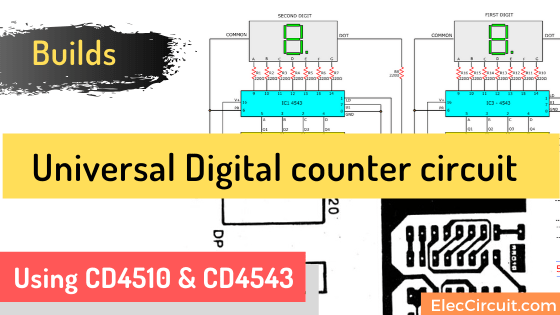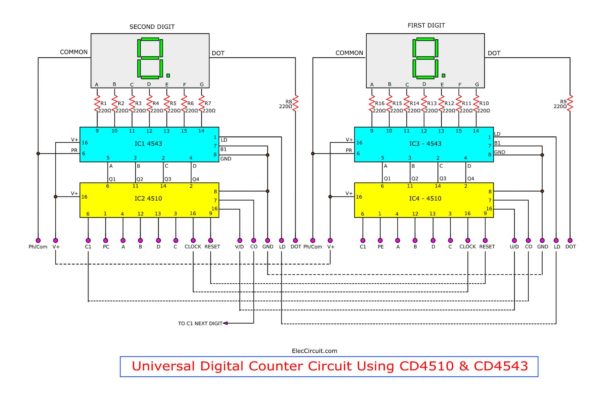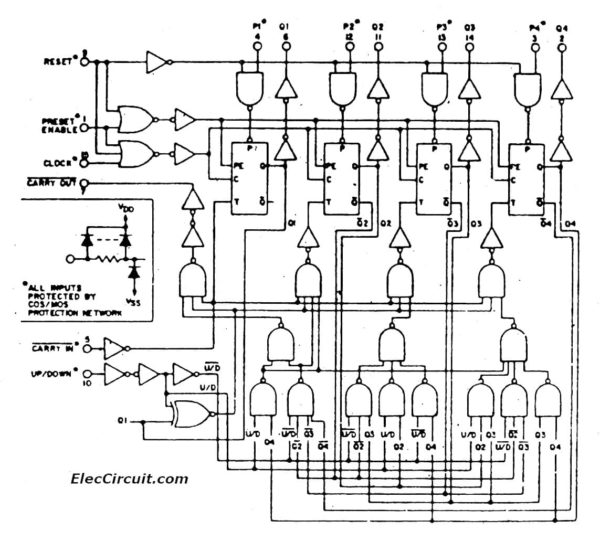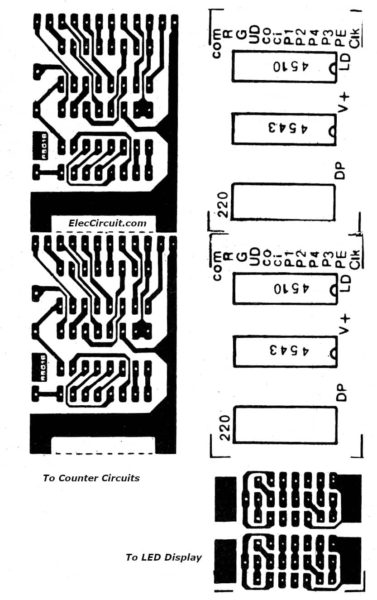Imagine you want to learn digital and build a counter circuit. This is a Universal digital counter circuit on 7 segments LED display. You may like it.
It uses CD4510 & CD4543 as main parts. It is cheap due to the basic components. You can buy it in any electronics store.
Let me explain why you should interest it works.

The universal digital counter circuit has a lot of special features as follows.
- Count up or count down the time.
- Connect the output to a 7 segment LED both a Cathode common or Anode common.
- Keep a collection of information
- Can set number counting in advance.
How it works
See in the circuit below. It shows normal operation. We will set the circuit in 2 digits. Which if we want more than this.
We can connect other digits together as unlimited.

The heart of the circuit is composed of 2 parts.
- A decoder and drive LED display.
- The counter circuit on the Binary Code Decimal Output. Which we use IC2-CD4510.

Look at the above figure. It shows the internal structure of IC2-CD4510. We will see that they include the 4 D-type Flip Flop set of the counter circuit.
It’s too good for you, isn’t it? Look at below:
2 Digit Simple CD4026 Digital Counter circuit
How This Circuit works
Here is step by step of the simple working principle. First, enter the input signal to pin 5 of IC2-CD4510. It makes the counter circuit run to count the clock input signal.
And there is output at pin 6,11,14,2 in Binary Code form. Then, apply to the input of pin 5,3,2,4 of IC1-CD4543.
6 Interesting Details:
CD4543
They will decode signals out to drive the 7 Segment LED to display value that can count.
When the circuit run to 10. It will have a Co signal (Carry Out) to apply to pin Ci (Carry in) of the next section respectively.
The 7 Segment LED
We can use both the anode common or the cathode common. With connecting that pin Ph (pin 6) of IC1-CD4543 to pin common of the 7 segments LED.
It is really good!
Read also: The experimentation of 2 bit binary counter using CD4027 SN7473
The Reset Circuit
We can reset counting into 0 (zero). By connecting the positive voltage at pin reset (pin 9) of IC2- CD4510.
The Default Number
We can set the default number for the count. It is easy to do by entering a positive voltage ( the state of digital logic is 1) in the pin PE (pin 1) of IC 2.
Then, set value as you want to start with Binary Code on pin P1, P2, P3, P4 (pin 4,12,13,3)
Counting up or down
Determining the circuit that count-up or count-down is simple. By using the control voltage at pin 10 of IC2.
If we enter the positive voltage into, the circuit will count up. And, then we connect to ground the circuit will count down.
Pause counting
During, the counter circuit works. If we want to stop the numbers show the moment. By the counter circuit still continue to work as normal.
We can do by connecting pin LD (pin 1) of IC1 to the ground. And, when we want the circuit display as the current value that is counting. We just connect to a positive voltage to pin LD only.
Read Also: Random counter circuit with 7 segment display using basic digital IC
How to build
We can assemble this circuit sets into PCB as shown in the Figure below. We will see that PCB is divided into 2 parts:

The part that holds the 7 segments LED of 2 pcs, on the same sheet.
And aother one as the main circuit.
Connect the display PCB and a counter circuit together. We solder the ground to the edge of the PCB, the two together.
Then, use the end pins R1-R8, join together others layer.
Read next: Multi function digital frequency meter circuit 0-100MHz
When you connect the counter circuit together multiple sectors.
Do not forget: You want to the circuit in counting two forms:
Synchronous Counter.
Connect pin Co from the beginning, to pin Ci of the next section respectively.
Asynchronous counter
Connect pin Co from the beginning section to pin Clock(pin 15) of next.
We should choose the digits display as 7 segments LED that use low current.
Check out these related articles, too:
- Digital voltmeter circuit diagram using ICL7107 / 7106 with PCB
- LED Dancing light circuit with Music
- Big digital clock circuit without microcontroller
GET UPDATE VIA EMAIL
I always try to make Electronics Learning Easy.
Hello sir/ma’am,
This circuit is so useful but I’m confused.
Because i want to make presettable counter.
Still there are some problem.
Help me.